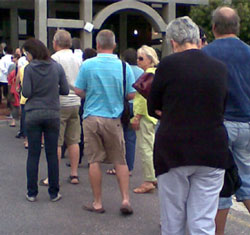
"Through its registration drive, the IEC hopes to increase registrations to 80% of the voting age population in line with levels of previous elections which would require an additional two million voters to register," IEC chairperson Advocate Pansy Tlakula told SAnews, on Wednesday, after briefing reporters about the IEC readiness ahead of this weekend's voter registration drive.
Her message to volatile areas such as Malamulele in Limpopo, where residents are demanding their own municipality, is that all South Africans irrespective of where they are, should allow the voter registration to go smoothly as planned.
"We've no doubt that this coming weekend, voter registration will go smoothly. That all our registration stations will open and we've put measures in place to ensure that registration proceeds smoothly, even in Malamulele," she said.
To those who are writing their final examinations, Tlakula said: "Our voter registration process is very quick and I'm sure that even those young people who are preparing for their exams can take a few minutes to visit our registration stations in their respective areas in order to register for next year's general elections".
With regard to this weekend voter registration readiness, Tlakula said everything is in place for eligible voters who will visit the IEC's 22,263 registration stations between 8am and 5pm on Saturday and Sunday.
She said a total of 45,795 election officials will be standing by to register new voters and to verify the registration details of existing voters.
The voting districts represent a 7% increase over the 20,859 districts in place for the 2011 local government election.
The growth reflects an expansion of voting districts in predominantly rural areas with increases of 15% in the Free State, 10% in Limpopo and 9% each in the North West and KwaZulu-Natal to reduce the distance required for voters to travel to voting stations.
She said all registration materials have been delivered to eight metropolitan councils and 226 local municipal councils and will be delivered over the next two days to the registration stations in readiness for opening on Saturday morning.
"Just fewer than 30,000 Zip-Zip machines have undergone testing and battery checks to ensure they are ready for the weekend.
"The machines would be in an optimal functional condition as a result of these testing procedures they have undergone," she said.
To register, eligible voters need to be in possession of a green bar-coded ID book, or a Temporary ID Certificate (TIC) or the new smart card ID.
The Commission is grateful to the Department of Home Affairs which has agreed to open its branches on Saturday and Sunday to coincide with the registration station hours (8am to 5pm) for the collection of ID books, smartcard IDs or Temporary Identity Certificates (TICs).
Registration stations are located at a wide variety of premises which are leased by the Electoral Commission for registration weekends and voting days.
These include schools (65%), community and civic halls (10%), places of worship (7%) and other community venues.
Approximately 7% will use temporary facilities including tents and other temporary structures. There will also be 30 mobile registration stations which will be used in rural areas.
Currently the Free State has the higher percentage of voter registration at 80% followed by the Eastern Cape (79.6%), Northern Cape (77.6%), Limpopo (77.0%), KwaZulu-Natal (75.0%) and North West (73.5%).
The provinces with the lowest registration percentages are Mpumalanga (70.3%), Western Cape (70.3%) and Gauteng (69.2%).
SAnews.gov.za is a South African government news service, published by the Government Communication and Information System (GCIS). SAnews.gov.za (formerly BuaNews) was established to provide quick and easy access to articles and feature stories aimed at keeping the public informed about the implementation of government mandates.
Go to: http://www.sanews.gov.za